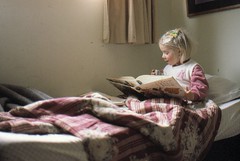Narration is a skill that, on the surface, seems so simple that many parents take for granted its power. I would say that the biggest misunderstanding people have of narration is a belief that it is solely for evaluation of students' learning. The misunderstanding is this: Narration is not the evaluation of the learning. Narration is the learning. During narration, a child is developing a mastery of a huge range of complex skills, including classification, recollection, interpretation, and on and on. The 'King' skill being developed -- the one which is the very hallmark of an educated person is the habit of attention. Narration, the simple retelling of a reading in one' s own words, is the very best way to develop this essential, valuable habit.
Okay, let's get practical.
If you have studied Charlotte Mason philosophy, you know the 'correct' way to do narration is that the teacher (that's you) is to preread the passage and pick out any difficult vocabulary to define for the child ahead of time. In addition, you write down a few important dates, places or names for the child to refer to during his narration to avoid interrupting his train of thought. In Charlotte's schools, different children were called on to narrate, but no one knew who would be called, so each child had to be prepared to narrate everything he read.
I don't know about you, but with several children reading many different books, there is no way I could possibly read ahead, let alone prepare vocabulary, dates and names.
This is where ideal meets real.
In our home, children do narrate just about everything they read. The children read the passage, or listen to it being read aloud, only once. (This is very important to their ability to pay attention. Knowing the passage will be re-read is license to be lazy in attending.) I only read aloud the Bible and choose different children to narrate. Otherwise, readings are independent and the children simply come to find me and let me know they are finished a reading and ready to narrate. They narrate while I fold laundry, nurse a baby or chop veggies for lunch. I rarely sit and do nothing but offer eye contact. I simply can't. And, very often, I have never even read the books they are narrating.
The point is, I could feel guilty that I'm not doing it the 'correct' way, or I can embrace my life and my home and come up with a workable plan to make narration happen. Guess what?! It's okay!! My children are learning magnificently and are very capable and thorough narrators and we've been doing it this way since the beginning.
Basic oral narration, as I have outlined in this post, is your bread and butter. Don't feel like you have to come up with a whole bunch of fun alternatives to simple retelling of the passage in the child's own words. These ideas can be fun for a change once in a while, but a habit is formed when you do the same thing time after time. Let the living stories your child reads and the ideas that feed his mind offer the variety he needs.
How do you include narration in your homeschool? Have you ever tried narrating for your children?
Next Friday, I will cover 'Common Questions about Narration. If you have any questions you'd like to see answered, please ask them in the comments section of this post. Otherwise, I will be covering questions I get asked most often in my real life. :)
Subscribe to:
Post Comments (Atom)





Hi there Kristin~
ReplyDeleteI just wanted to come by and say Hi~ its neat to hear about Charlotte Mason!
Blessings,
Georgiann
Thank you for your comment, Georgiann. Charlotte Mason is my educational heroine, as one CM author says, so I hope you will enjoy learning about her! :)
ReplyDelete